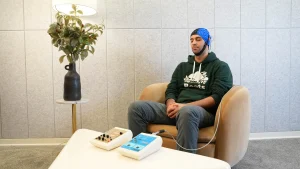In the hustle and bustle of modern life, one crucial element often overlooked is the importance of a good night’s sleep. Sleep is not merely a state of rest; it is a fundamental aspect of our overall well-being, influencing physical health, mental acuity, and emotional balance. In this blog, we will delve into the profound effects of sleep on our lives, explore the consequences of sleep deprivation, and discuss practical solutions to enhance the quality of our sleep.
The Power of Sleep:
Quality sleep is not just a period of rest; it is a fundamental aspect of overall well-being. The power of sleep extends beyond mere relaxation, influencing various aspects of our physical and mental health. Understanding the profound impact of sleep involves recognizing its role in two key areas: Physical Restoration and Cognitive Function/Memory Consolidation.

Physical Restoration:
Sleep is a vital time for the body to repair and regenerate. During deep sleep, tissues and muscles are repaired, immune function is strengthened, and the body releases growth hormones. Quality sleep is directly linked to physical health and resilience.
Cognitive Function and Memory Consolidation:
Sleep plays a crucial role in cognitive function and memory consolidation. It aids in processing and storing information acquired during the day, contributing to improved learning and decision-making abilities. Lack of sleep, on the other hand, can impair concentration and memory recall.
Emotional Well-being:
Adequate sleep is essential for emotional regulation and mental well-being. Sleep deprivation can contribute to irritability, mood swings, and an increased susceptibility to stress. Chronic sleep issues are also associated with a higher risk of developing mood disorders such as depression and anxiety.

Consequences of Sleep Deprivation:
Sleep deprivation, or the consistent lack of sufficient sleep, can have far-reaching consequences on various aspects of our health and daily functioning. Understanding these consequences sheds light on the importance of prioritizing adequate and quality sleep.
Impaired Cognitive Performance – Sleep deprivation can lead to reduced alertness, impaired concentration, and slower reaction times. This not only affects daily activities but can also pose risks in situations that require quick decision-making, such as driving or operating machinery.
Increased Risk of Chronic Conditions – Chronic sleep deprivation is linked to an increased risk of developing serious health conditions, including obesity, diabetes, cardiovascular diseases, and compromised immune function. The body’s ability to regulate hormones related to appetite and metabolism is disrupted when sleep is insufficient.
Mental Health Challenges – Sleep disturbances are closely tied to mental health challenges. Insomnia and poor sleep quality can contribute to the development or exacerbation of mental health disorders, including anxiety and depression.

Common Types of Sleep Disorders
Insomnia – Insomnia is characterized by difficulty falling asleep or staying asleep despite having the opportunity for adequate sleep. It can be transient or chronic and is often associated with factors such as stress, anxiety, or lifestyle choices.
Sleep Apnea – Sleep apnea is a condition where breathing is repeatedly interrupted during sleep. This can occur due to a temporary collapse of the airway (obstructive sleep apnea) or a failure of the brain to signal the muscles to breathe (central sleep apnea). Individuals with sleep apnea often experience loud snoring and may wake up gasping for breath.
Narcolepsy – Narcolepsy is a neurological disorder that affects the brain’s ability to regulate sleep-wake cycles. People with narcolepsy may experience sudden, uncontrollable episodes of falling asleep during the day, even in inappropriate situations.
Restless Legs Syndrome (RLS) – RLS is characterized by an irresistible urge to move the legs, often accompanied by uncomfortable sensations such as tingling or aching. Symptoms typically worsen at night and can interfere with the ability to fall asleep.

Periodic Limb Movement Disorder (PLMD) – PLMD involves repetitive, involuntary movements of the legs or arms during sleep. These movements can disrupt sleep and lead to daytime fatigue.
Circadian Rhythm Sleep Disorders – Circadian rhythm sleep disorders occur when the internal body clock, which regulates the sleep-wake cycle, is out of sync with the external environment. Conditions such as jet lag, shift work sleep disorder, and delayed sleep phase syndrome fall under this category.
Sleepwalking and Sleep Talking – These are types of parasomnias that involve physical activity during sleep. Sleepwalking involves complex actions such as walking, while sleep talking consists of talking or making sounds during sleep.
Nightmares and Night Terrors – These are disturbances that occur during REM (rapid eye movement) sleep. Nightmares are vivid, frightening dreams that can cause awakening and distress, while night terrors involve intense fear, screaming, and physical manifestations of anxiety during sleep.
Bruxism (Teeth Grinding) – Bruxism is a sleep-related movement disorder characterized by the grinding or clenching of teeth during sleep. It can lead to dental problems, jaw pain, and disrupted sleep.
Sleep-Related Eating Disorder (SRED) – SRED involves the consumption of food during the night, often in an uncontrolled and unconscious manner. Individuals with SRED may have no memory of these episodes.
Understanding the specific characteristics and symptoms of these sleep disorders is crucial for proper diagnosis and effective treatment. If you suspect you may have a sleep disorder, it’s advisable to consult with a healthcare professional for a comprehensive evaluation and guidance on appropriate interventions.

Solutions for Quality Sleep
Establish a Consistent Sleep Schedule – Maintain a regular sleep schedule by going to bed and waking up at the same time every day, even on weekends. This helps regulate your body’s internal clock, promoting better sleep quality.
Create a Relaxing Bedtime Routine – Develop a calming bedtime routine to signal to your body that it’s time to wind down. This may include activities such as reading, gentle stretching, or practicing relaxation techniques like deep breathing.
Optimize Your Sleep Environment – Ensure your bedroom is conducive to sleep by keeping it dark, quiet, and cool. Invest in a comfortable mattress and pillows, and remove electronic devices that emit blue light, which can interfere with the production of the sleep-inducing hormone melatonin.
Limit Stimulants and Screen Time – Avoid stimulants such as caffeine and nicotine in the hours leading up to bedtime. Additionally, reduce screen time before sleep, as the blue light emitted by electronic devices can disrupt the body’s natural sleep-wake cycle.
Regular Exercise – Engage in regular physical activity, but try to complete exercise sessions at least a few hours before bedtime. Regular exercise has been shown to improve sleep quality and reduce symptoms of insomnia.
Mindfulness and Relaxation Techniques – Incorporate mindfulness practices and relaxation techniques into your daily routine. Meditation, yoga, or guided imagery can help calm the mind and prepare the body for restful sleep.
Evaluate and Address Sleep Disorders – If persistent sleep issues persist, consider consulting a healthcare professional. Sleep disorders such as insomnia may require specific interventions or treatments.

Elumind Centres Sleep Program: A Personalized Approach
At Elumind Centres, we recognize the intricate relationship between sleep quality and overall health. For individuals grappling with sleep issues, our tailored program offers a comprehensive solution.
We’ve developed a specialized program designed to address the unique needs of individuals struggling with sleep quality. Our approach begins with a thorough and comprehensive assessment, incorporating various methodologies to gain a holistic understanding of your sleep patterns.
Assessment Components
Therapeutic Assessment – Our therapeutic assessment aims to uncover underlying factors that may be contributing to sleep disturbances. We delve into lifestyle, stressors, and personal experiences to tailor our solutions to your individual context.
Vital Recordings – Monitoring vital signs provides valuable data about your physiological state during sleep. This includes tracking heart rate, respiratory rate, and other vital indicators to identify patterns and potential issues.
Biofeedback Assessment – Utilizing biofeedback, we gather real-time information about your body’s physiological responses. This data allows us to identify stressors and implement targeted interventions to enhance relaxation and improve sleep.
QEEG Brain Mapping – Our program includes QEEG brain mapping, a non-invasive technique that measures electrical activity in the brain. This helps us identify any irregularities or patterns that may be contributing to sleep disorders.
Fitbit Tracker – Incorporating modern technology, we utilize Fitbit trackers to monitor your daily activities, sleep patterns, and overall lifestyle. This data serves as a valuable tool in crafting personalized interventions.
Personalized Solutions
Based on the results of our comprehensive assessment, we offer personalized solutions tailored to your unique needs:
Neurofeedback – Neurofeedback is a therapeutic technique that aims to regulate brain activity. By providing real-time feedback on brainwave patterns, we can train the brain to achieve a more balanced and optimal state conducive to better sleep.
Biofeedback – Biofeedback techniques empower you to gain control over physiological responses, reducing stress and promoting relaxation. This personalized approach helps address specific issues identified in the assessment.
Cognitive Behavior Therapy for Insomnia (CBTI) – CBTI is an evidence-based therapeutic approach specifically designed to address insomnia. Through cognitive restructuring and behavioral interventions, we work together to reshape thoughts and behaviors that may be hindering restful sleep.
At Elumind Centres, our commitment is not just to improve sleep quality but to empower individuals with the knowledge and tools to achieve sustainable, long-term well-being. If you’re ready to embark on a journey toward better sleep and a healthier life, our team is here to support you every step of the way.

Conclusion:
Understanding the profound impact of sleep on our lives is the first step toward prioritizing this essential aspect of well-being. By implementing these solutions and fostering healthy sleep habits, we can unlock the transformative power of quality sleep, enhancing our physical health, cognitive function, and emotional resilience. Remember, a good night’s sleep is not just a luxury; it’s a fundamental investment in a healthier, more vibrant life.
Elumind Centres for Brain Excellence is an integrated mental health centre offering solutions that can help you with your mental/brain health needs. To start your journey, book your FREE 15-MINUTE PHONE CONSULTATION. We are here for you.








